Redistricting’s See-Saw precludes pleasing us all
by Robert Lynch, March 24, 2022
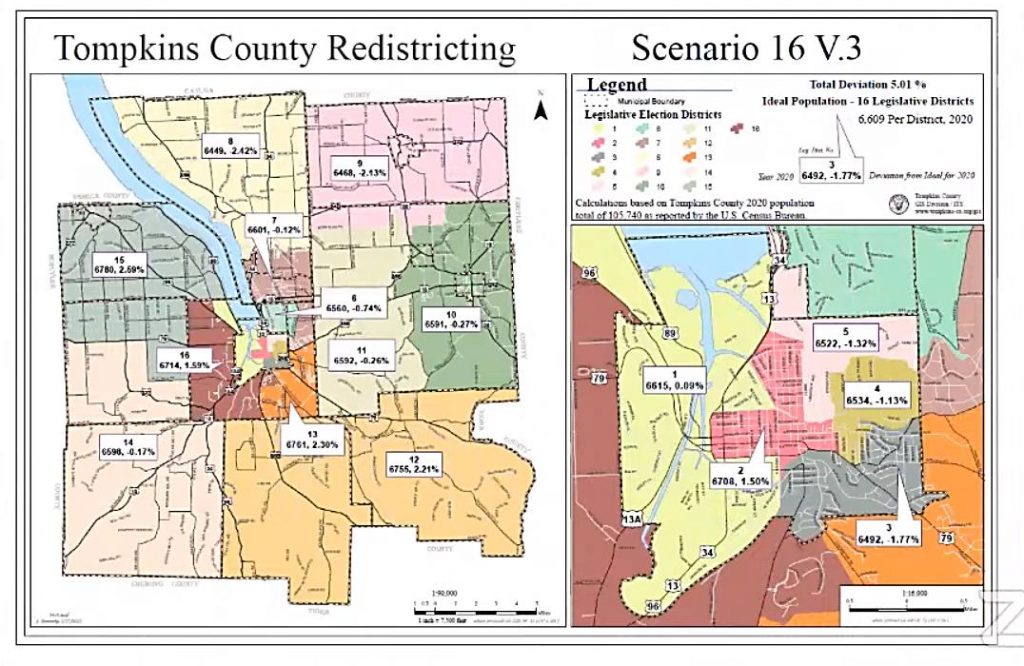
Two weeks earlier, it appeared the Town of Enfield might soon win a prize its former Supervisor, Beth McGee, had once talked about: The clout earned by having one and only one town-wide representative on the Tompkins County Legislature. Now that prospect could be slipping away.
That’s because most of the revised legislative maps presented to the Tompkins County Independent Redistricting Commission Tuesday night (Mar. 22nd) would keep Enfield represented the way it’s been for decades; split between a Newfield-based legislator to the south and a Ulysses-centered one to the north.
Without taking any vote, the Redistricting Commission Tuesday effectively threw away its first-round batch of maps presented it by the County’s computer expert March 8th. Instead, members eyed four new redistricting scenarios, three of which would leave Enfield split much as it is now. The fourth map, while keeping Enfield within a single district, stands little chance of gaining approval.
Still, quite simply, Enfield’s loss would be Newfield’s gain. Some of the discarded first-round maps would have, for the first time in the Legislature’s history, split the Newfield Town between two legislators, tacking varying portions of eastern Newfield onto Rep. Dan Klein’s Danby-Caroline district. Some of those plans would also have cut Klein’s cherished home base to bits, something the Danby legislator has made crystal clear he wouldn’t like.
Although the County Legislature retains the final authority to alter district lines, lawmakers have handed the Independent Commission wide latitude to recommend the best plan, just as it has in decades past. Courts demand district lines get redrawn every decade to reflect population shifts.
Though the latest U.S, Census was taken in 2020, its data released only last summer, whatever the Legislature decides won’t take hold until new elections take place at mid-decade.
At its earlier meeting March 8th, the Commission directed map-makers to focus attention on expanding the current 14-member Legislature by one person or two. The Commission concluded a slightly larger membership made the math easier, and the lines would fit best.
Be advised it wastes gray matter attempting to memorize map boundaries at this early stage. They’ll change as they’re refined. Just suffice it to say the Tuesday meeting’s key take-away was that the two districting designs Commission members liked best—coded as Scenario’s 15 V.3 and 16 V.3—each alternative denoting legislature size—would keep all of Newfield represented by a single legislator, but divide Enfield much as it is at present, with State Route 79, Mecklenburg Road, the line of demarcation.
But not all are happy. Just understand the current disagreement centers not so much on district lines as on the size of the County Legislature itself. One of the Legislature’s two Dryden members, Mike Lane, urged the Commission Tuesday to cut the Legislature’s size, not expand it.
“Please don’t not consider the 13 (member) version,” Lane told the Commission. “I think having fewer legislators is the way to go.”
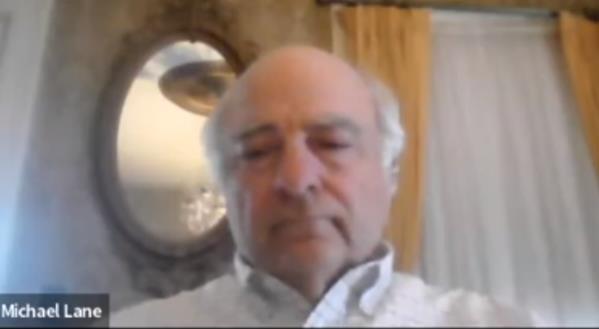
“I think the trend in many counties is to go with fewer legislators, not more,” Lane continued. Lane also talked carpentry. He pointed out the Legislature’s massive—and expensive—oval table had been built for only 15 members plus key support staff. “I don’t know where they (that is, the staff) would go,” he lamented.
Later in the meeting someone suggested the County Administrator, budget chief, and attorney could sit at what one might call the “kid table,” a boardroom-size table at the side, or else in the back of the room.
Lane’s smaller-is-better idea got little traction among Commission members Tuesday. Instead, one or two of them hinted they’d prefer an even larger Legislature, one with as many as 17 seats. Though it might not necessarily do so, some thought the increase could help reach the City of Ithaca’s goal to hold five legislative districts, their boundaries coterminous with the City’s five wards. And some foresaw other advantages.
“Isn’t it better for people to have more representation?” Commission member Carolyn Chang posed to her colleagues. “Doesn’t it serve individual citizens and voters to have more representatives who are presumably representing all the groups because it allows for more representation and conversation?”
To an extent, Commission chair Hank Dullea said political scientists would concur. They’d say “a smaller group requires the member of the legislature to balance interests,” Dullea said. By contrast, with the legislature larger and districts smaller, each member could better represent a niche community or neighborhood, he added. “They don’t have to listen necessarily the same way to others and balance off competing interests.”
But it’s the slicing of the pie that’s our whole county with its mix of city, countryside and inconveniently-placed municipal lines that frustrates Commission members the most. And those troublesome imperfections may, in the end, dictate the result.
“I remember from Seventeen, as it was initially crafted, I hated that,” Commission member (and this writer’s sister) Marcia Lynch recalled, “because it did not make any sense with communities of interest the way things were split.” By the way, that 17-seat draft would have divided Enfield among three county legislators. It was, at least for our town, a mess.
The Commission ended its meeting Tuesday directing the County’s Director of Information Technology, Greg Potter, to tweak the 15- and 16-member maps and report back at its next meeting, April 12th.
“I think that looking at both 15 and 16 does give you an even-numbered legislature and an odd-numbered legislature,” said Potter. “There’s plusses and minuses to do both of these.”
###
Enfield Salt Barn Bid accepted
Zoom meetings to continue
Posted by Robert Lynch, March 22, 2022
The bid was slightly higher than members had wanted. But the Enfield Town Board Tuesday night (March 22, 2022), granted preliminary acceptance to Park Lane Construction’s offer to build a wooden barn to store salt and sand behind the Town Highway Department’s main garage.

Town Board acceptance came at a 45-minute special meeting at which the Board also declined to alter its current practice of meeting remotely despite the waning presence of COVID-19. Enfield may remain the only Town in Tompkins County whose governing board still meets exclusively via Zoom. It’s done so since last October.
As for the salt shed: Clyde, NY-based Park Lane Construction tendered on the last day of February—the Town’s bidding deadline—its offer to build the 80-by-168-foot “Hi Arch Gambrel Salt Storage Building.” The barn would hold 9,000 tons of salt and sand and have the side-entrance that Highway Superintendent Barry “Buddy” Rollins had requested. It would cost $728,501, some four per cent above the bid maximum the Town Board had set in its Request for Proposals last December.
Only one other company, Illinois-based Bulk Storage Inc., had bid on the project. But Bulk Storage’s bid, while considerably lower, stood vastly at variance with the Town’s specs. Bulk Storage would have built a canvas-topped vaulted dome, the kind of shelter neither the Town Board nor Superintendent Rollins wanted. Bulk Storage would have built its dome for just over $537,000.
The Town Board’s unanimous vote Tuesday made Park Lane’s acceptance conditional upon further discussions with the contractor and with others. Supervisor Stephanie Redmond will contact the builder to see if Park Lane can shave its price to within the Town’s $700,000 limit. She’ll also investigate whether the Board should retain a construction manager, and if so, whom.
There’s also the matter of funding. Enfield already has a State-awarded grant to underwrite approximately half the barn’s cost. But other financing, including probable bonding, remains to be shored up.
“There is clearly grant money involved, but if there are matching funds, bonding, or other financing processes involved, these need to be attended to at the front end,” Guy Krogh, Attorney for the Town, wrote in a March 10th email to the Board, discussed Tuesday.
Councilperson Jude Lemke, an attorney herself, suggested the “front end” nature of Krogh’s financing advice deserved attention. Lemke also worried that without a construction manager, Enfield might repeat the mistake it made nearly two decades ago when it built its Highway Garage, only to find construction flaws afterward.
While Krogh’s memo suggested the Town promptly put financing in place, Redmond told the meeting her bonding consultant had suggested a need to first firm up the price; creating a potential catch-22. Councilperson Robert Lynch (this writer), cautioned not “to put the cart before the horse.” He sought, and received Board assurance that further discussions would not delay final action beyond the Town Board’s next scheduled meeting, April 13th. Lynch said he’d welcome a special meeting before then, if needed.
Lynch also said—and colleagues agreed—that rebidding the project in the current inflationary economy would only bring a higher price the second time around.
Building a salt and sand barn satisfies twin goals among Enfield Board members, past and present. Superintendent Rollins wants the barn to provide his road supplies better protection. Environmentalists, including Redmond, seek the shed to prevent salt from leaching into the aquifer that lies beneath the Highway Department site.
****
Only after the Enfield Board awarded the salt shed bid—and did so without rancor—did political tensions rise. On not one, but two separate issues, none of the Board’s other four members offered to second and thus bring to a vote a pair of Councilperson Lynch’s motions. One of them would have resumed in-person meetings of the Town Board as soon as April.
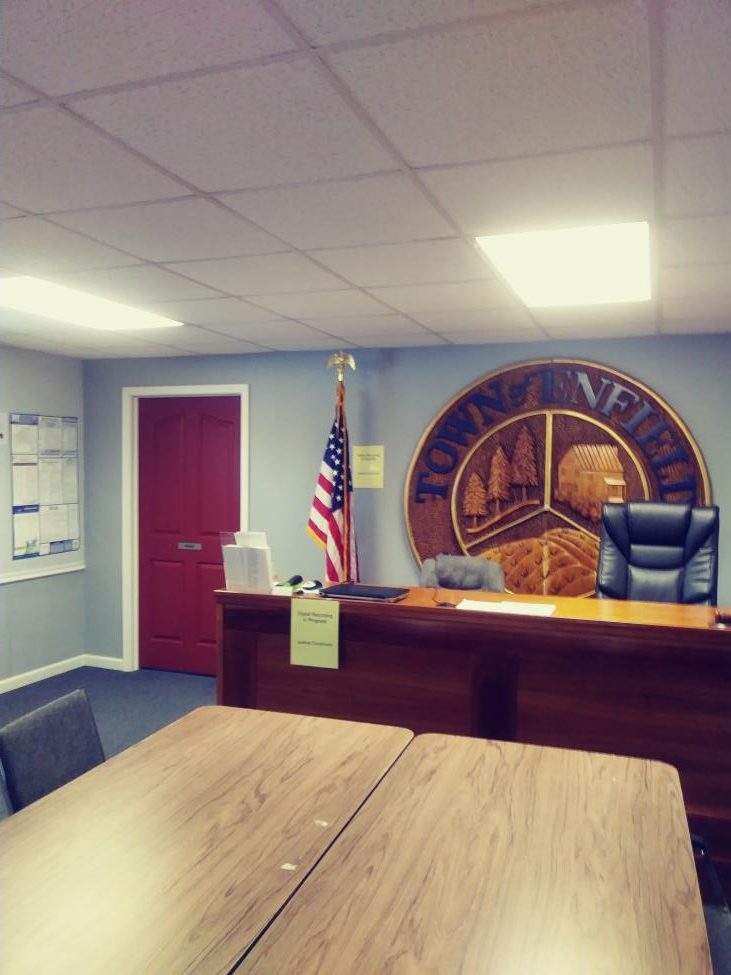
“It’s only by the luck of the draw,” said Lynch, that Governor Kathy Hochul hadn’t already ended the Enfield Board’s months-long practice of meeting only online. Lynch said Hochul could have forced the Board back into its Town Courthouse meeting room last week had she not signed an eleventh-hour extension of her COVID-spawned executive orders March 16th. Hochul’s ending the orders would have made Zoom-only meetings illegal.
Lynch claimed he’d visited scores of Enfield constituents during his Democratic Party candidate petitioning in recent weeks. And he said a frequent complaint he’s heard involved the lack of in-person governance. Lynch predicted Hochul’s current extension, now through April 15th, would be her last. The Enfield Board’s next meeting falls just two days before the Governor’s new deadline.
Not only did the Councilperson’s meeting motion lack a seconding vote; so, too, did Lynch’s request that should the Board empanel an advisory committee to recommend funding priorities under the American Rescue Plan (ARPA), the Board should make all such committee meetings public. He proposed minutes be taken, and all Town Board members become eligible to attend.
Lynch worried aloud that if meetings were kept closed, ARPA funding recommendations could be made “behind the scenes.”
“$100,000 for the Food Pantry and $20,000 for a park,” Lynch used as examples, could then be plopped onto the tables of unsuspecting Town Board members in take-it-or-leave it fashion.
As exchanges grew sharp, Redmond rebutted Lynch and insisted that no such “behind the scenes” efforts are planned. Nonetheless, Supervisor Redmond recommended that she, herself, sit on the ARPA committee. Councilperson Lemke volunteered to join as well—though Lemke later withdraw her request.
Lynch’s failed motion would have made any new ARPA committee similar to the “Expanded Budget Committee” the Tompkins County Legislature employs at budget time. Redmond rejected Lynch’s idea, arguing the necessary posting, recording, and note-taking requirements would bring too much bother and expense. Lynch said he’d oppose the committee’s formation without public transparency. In response, and for the moment, Redmond and others on the Board let the ARPA committee idea drop.
The Town Board did agree, however, and without dissent, to hold a “public forum” on ARPA allocations before its April 13th session.
In its only other business Tuesday, after several months of discussions, often in closed session, the Town Board unanimously reappointed Henry Hansteen to another five-year term on the Enfield Planning Board.
###
Calling All Candidates
Lane urges pols to condemn Trump’s Putin praise
by Robert Lynch, March 18, 2022
There were two ways to read it. On one level, you could see it as just a simple show of solidarity for Ukraine. On the other, it stood as a not-too-subtle challenge to a man across the table, the Republican who seeks to be our next rep in Congress.
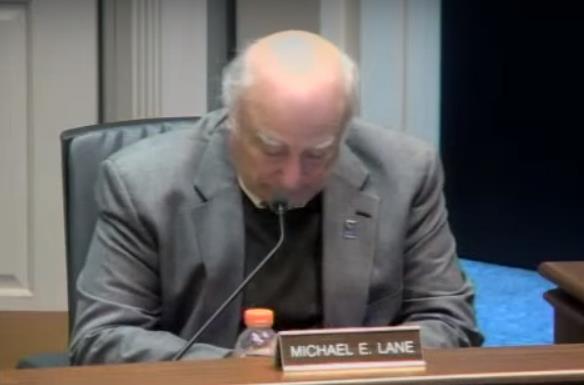
After requesting, and receiving, a moment of silence near the start of Thursday’s County Legislature meeting, silence in memory of “the women, the children, the men, the soldiers”—and even the Russian soldiers—who’ve died in Ukraine, Democratic Dryden legislator Mike Lane took direct aim at Donald Trump for the ex-President’s pre-war remark praising Russia’s Vladimir Putin as a “genius.”
“It doesn’t take genius to kill women and children and soldiers,” Lane rebutted. “It takes genius to keep them alive… And it doesn’t help when our former President embraces Mr. Putin.”
Lane never mentioned Donald Trump by name. Nor did he name directly his colleague at the opposite corner of the Legislature’s long oval, table, Lansing Republican Mike Sigler, candidate for Congress. But Lane likely had Sigler most in mind when the Dryden legislator continued his admonition during his allotted privilege-of-the-floor.
“And I certainly hope that all of our Congressional candidates, from whatever party, those that are aspiring to be in Congress, will condemn it (Trump’s ‘genius’ comment) in no uncertain terms,” Lane told colleagues.
If Lane offered bait to be taken, Sigler didn’t bite. Unlike Lane, the Lansing Republican never sought floor privileges Thursday, commenting only later regarding unrelated matters of business.
Sigler, a Republican moderate, will likely face Cayuga County’s more conservative Brandon Williams in a June G.O.P. Primary. Observers see Williams as Trump-friendly. And in his campaign to date, centrist Sigler has conspicuously steered clear of Trump’s hold on the party, his presidency, the January 6th insurrection, and Trump’s claim of a stolen election.
“Mr. Putin has been almost a megalomaniac,” Lane told legislators during his floor remarks. But Lane conceded “there’s no simple answer” to the Ukrainian war. We must hold together international alliances, he said, and also recognize Russia’s status as a nuclear power.
“We have to continue the way we’re going and ratchet down these sanctions the best we can,” Lane counseled those at Thursday’s session.
****
Apart from the evening’s main item of business, namely the appointment of Lisa Holmes as County Administrator (see separate story), much of the Thursday, March 17th County Legislature meeting proceeded uneventfully.
- The Legislature endorsed a Resolution handed up by the Tompkins County’s Advisory Board on Indigent Defense (ABIR) that urged New York State increase the statutorily-set compensation rates for Assigned Counsel attorneys. The ABIR proposal, advanced by several attorneys’ groups statewide, would boost hourly assigned counsel pay from $60 to $120 per hour for misdemeanors, and from $$75 to $150 per hour for felonies and other matters. The State has not raised assigned counsel pay since 2004. The adopted Resolution would have the State pay the increase. (Full disclosure: This writer, a member of ABIR, addressed Thursday’s meeting.)
- And on another issue of pay, the County Legislature voted to increase hourly compensation for election and poll workers, part-time personnel employed only on or near election days. A committee recommendation would have hiked their pay to $14 per hour. But Dryden’s Greg Mezey successfully pumped the rate up to $15.32 per hour, the county’s purported “living wage.” Only legislator Lane opposed Mezey’s last-minute amendment.
###
Lisa Holmes named County Administrator
by Robert Lynch, March 17, 2022; updated, March 18, 2022 @ 12:15 AM
Lisa Holmes, who rose through the ranks of Tompkins County Government for more than two decades, Thursday became the person in charge of it all, appointed by its Legislature as Tompkins County Administrator, Holmes the first woman and the first openly LGBTQ appointee to hold that office.
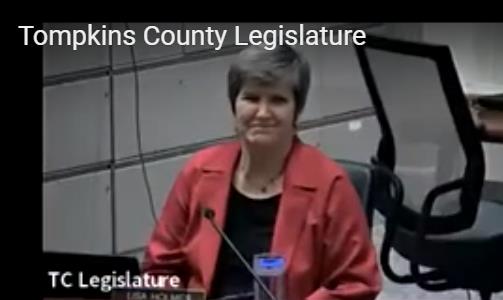
“Anyone that’s worked with Lisa knows that she’s hardworking, knowledgeable, easy to work with… and really great at Karaoke,” Legislature Chair Shawna Black said in praising Holmes’ abilities and talent, while also revealing their closeness as friends. “She’s comfortable managing staff,” Black added, “and has the respect of so many of her colleagues.”
Holmes, who’s served as Deputy County Administrator and before that as Director of the Office for the Aging, has most recently been Interim County Administrator, serving since Jason Molino’s departure in May of last year.
According to a County news release posted simultaneously with her appointment, Holmes joined county government in 1998. She became Deputy Administrator in 2018. During her tenure in that role, she also doubled for more than a year in guiding the Human Resources Department through a rocky administrative transition.
“You have shown that you are capable by your running the different departments,” said Lansing legislator Mike Sigler. “You have risen to the call.”
Under the County Legislature’s closely-guarded Resolution—kept secret until after Thursday’s meeting had convened—Holmes’ appointment was made effective the next morning, Friday, March 18th. She’ll earn a boosted annual salary of $160,000, some $25,000 more than what Molino had earned when he left the post.
All 13 attending legislators Thursday supported Holmes’ promotion. (Danby legislator Dan Klein was excused.) After the appointment, all in the room gave Holmes a standing ovation.
“Thank you very much. This is humbling, and I really—I appreciate your confidence in me,” Holmes said in her typical reserved fashion, accepting the Legislature’s vote of support in a speech of only 58 words.
“I’ve grown my career here and Tompkins County’s been very good to me,” Holmes continued.
“She’s had so many different roles. She’s never let us down. We’re proud of her,” said Dryden’s Mike Lane, now the Legislature’s longest-serving member, Lane one of a half-dozen lawmakers taking turns to offer the appointee their praise.
Thursday’s appointment capped a months-long, two round, high-profile employment search, one that began shortly after Molino’s sudden departure last spring and spanned the transition from last year’s Legislature to this year’s, that change bringing with it as many as five new members. The search at one point involved a national head-hunter. But as it turned out, the county’s best candidate worked right under lawmakers’ noses.
“I’m just delighted that Lisa changed her mind and decided to take this on,” Budget Committee Chair Deborah Dawson said Thursday, confirming publicly what many knew unofficially, namely that Holmes had declined to apply during the first round search, but then extended her interest after new faces joined the lawmaking body in January.
Holmes, herself revealed the first round’s futility early last December, telling the Tompkins County Council of Governments (TCCOG) that “a nationwide search… did not result in a candidate to bring forward.” Holmes told TCCOG that a newly-constituted Legislature would renew the process. That promised second-round of applications and interviews ended with Thursday’s vote.
It was Newfield-Enfield’s Randy Brown who first revealed Holmes’ interest during his legislative update to the Newfield Town Board March 10th. Privately that night, Brown also told this writer that Holmes stood as one of perhaps three finalists, with closed-door interviews underway. Brown suggested Holmes was his favorite.
Legislators employed a bit of stagecraft leading up to their dramatic appointment Thursday, akin to picking Best Picture at the Academy Awards.
First, Budget Chair Dawson—as the rules required—requested the Legislature add to its agenda appointment of a County Administrator, name unstated. Legislature Chair Black quietly shuffled the order of committee reports to put Dawson’s report last. Then before the appointment, Black called a recess. Only then, upon request, did the Legislature’s clerk share the text of Dawson’s Resolution, Holmes’ name included. The meeting reconvened, a possible executive session to discuss the appointment got waived off, and Black placed Holmes’ appointment onto the floor.
In her new position, Lisa Holmes could become the highest paid County Administrator or County Executive in upstate New York. At least that’s how it stood last July when Dawson’s Budget Committee raised the salary for Molino’s successor by some $25,000 so to, as the committee had hoped, attract a wider crop of candidates. Holmes’ $160,000 equates to the salary of Westchester County’s Executive, who oversees a community with nine times as many people.
At the time of the salary discussions, legislators thought the County Administrator deserved to earn close to the ever higher compensation paid the President of TC3.
But back to the appointment: With women increasingly in the driver’s seat of Tompkins County Government, Chair Black drew attention Thursday to the evening’s milestone moment.
“As a county, we should also be proud that we’re having our first-ever female County Administrator,” Black crowed. “It’s about time.”
###
Enfield Board moves ahead toward building Salt Shed
by Robert Lynch; March 10, 2022
The choices are legend: Coke or Pepsi? Ford or Chevy? And yes, boxers or briefs? But for members of the Enfield Town Board, the decision of the moment is much different: Wood or canvas?
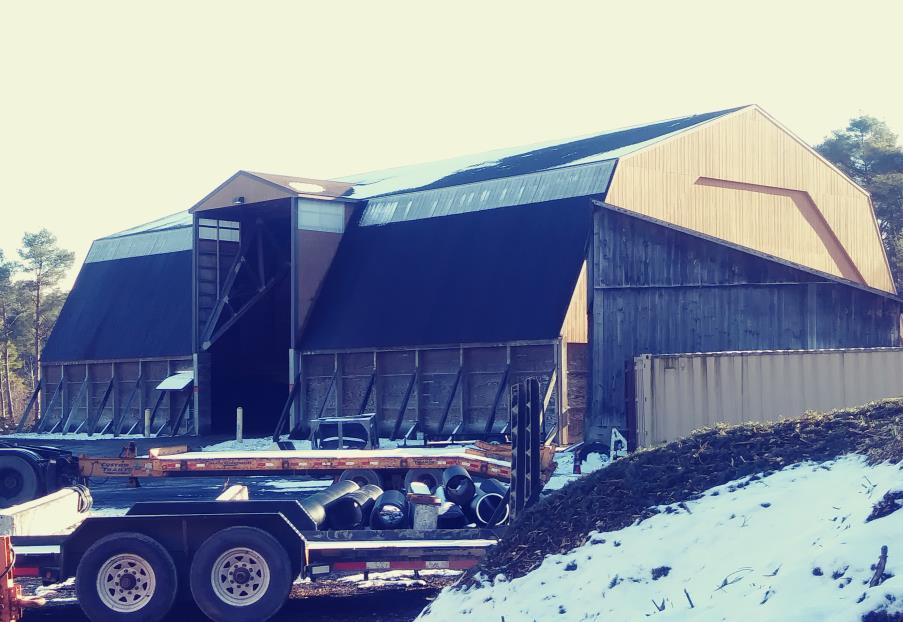
Wednesday night (March 9th) the Enfield Board took its first serious look at a pair of competing construction bids submitted at the end of last month by firms seeking to build a 9000-ton salt and sand storage shed behind the Highway Garage, a structure partially funded by a state grant. One company would build the structure of wood; the other with metal hoops and a canvas dome. The canvas one is cheaper. But the wooden building is more of what the Town Board said it wanted. Yet in truth, neither bid fully meets requirements laid down by the Board.
The two bids were unsealed March 3rd, yet left for Board members to ponder before they gave any serious public comment. They offered that comment Wednesday night as part of a lengthy, nearly four-hour-long monthly meeting. Members will re-convene for yet another round of discussions March 22nd. . It’s likely then when they’ll decide whether to accept one bid or perhaps reject them both. The timetable specified in bid documents calls for awarding the contract by month’s end in hopes of a springtime construction start. The grant specifies completion by mid-2023.
Of the two—and only two—offers submitted the Town, that of Clyde-based Park Lane Construction comes closer to spec. Park Lane would build a wooden structure similar to the salt storage shed in Newfield. It would have the side entrance Highway Superintendent Barry “Buddy” Rollins wants. Its walls would also be wooden. It would have the capacity that Rollins says he needs. But the company’s bid totals $728,501, slightly, only four per cent, over the $700,000 bid maximum the Town had set.
Competing bidder Bulk Storage Inc. would build its salt shed for less cost. But the Illinois-based contractor would erect a “Vaulted Fabric Dome” structure, a design in direct contravention to the wooden building the Town Board had sought. Bulk Storage tendered its bid at $537,533.
“It is what it is,” said Rollins, urging the Town Board accept Park Lane’s offer despite its overrun, and build what Rollins saw as the better building. “I’d scarf up the money,” Rollins told the Board.
Others on the Town Board indicated agreement, signaling their preference for the wooden option. Once Supervisor Stephanie Redmond gets answers to questions the bid papers failed to nail down, approval appears likely.
“If I had to decide this matter tonight, I’d go with the Park Lane offer,” Councilperson Robert Lynch (this writer) told the Board at Wednesday’s meeting. “But I don’t have to decide this tonight,” he added.
In an email to Board members the following day, Lynch wrote, “I heard this morning inflation is now running 7.9 per cent. Prices always go up, seldom down,” he said. “If we reject Park Lane’s bid as over the $700,000 cap… any subsequent low bid will likely be much higher. This is likely as good as it gets.”
The sentiment appeared shared with others on the Enfield Board Wednesday night. And most members expect a final decision within two weeks at the Special Meeting.
In lobbying for Park Lane’s wooden structure, Rollins Wednesday stressed wood’s durability. He claimed a wood building has a 35-year life span. The canvas alternative, he said, carries only a one-year warranty on its structure, and just 15 years on its fabric. “It’s 15 years versus 35 years,” the Highway Superintendent told the Board, drawing the comparison.
Enfield Planning Board Chair Dan Walker concurred with Rollins that the wooden building is the better value.
“I’d definitely recommend the wood structure,” said Walker, an engineer, told the Board. “When you’re dealing with salt, wood is the best for corrosion protection.”

Actually the Town of Enfield, with its numerous gravel roads, uses very little road salt in winter. It uses mostly sand. But the shed would store both. At present, to keep what salt it has from leaching away, the Highway Department buries it in a sand pile, a less-than-perfect solution.
Environmental concerns have driven Enfield’s desire to house salt and sand under cover, rather than keeping it out in the open. Town officials seek to protect the valuable and ecologically-sensitive aquifer that runs underneath the Highway Department complex..
In 2018, former Enfield Supervisor Beth McGee secured a $340,700 matching grant from the Department of Environmental Conservation to fund the salt barn on a 50/50 basis. At the time DEC awarded the grant, officials concede, construction cost less. Rollins stated Wednesday that the barn’s price had risen by as much as $200,000 in those four years. He claimed the building Park Lane now seeks to build for $728,000 cost a mere $520,000 when the grant was first sought.
And even so, the current Park Lane bid excludes such essentials as site work, paving, erosion control and electrical work. The contractor did say it would trim its price by $30,000, should Enfield accept a building slightly smaller, namely eight feet shorter.
Rollins told the Board he’s reluctant to pull his crews off highway maintenance to aid in the barn’s site work and thereby save the Town money by work in-kind. Yet, he added, “If that’s going to make it or break it, we’ll do it.”
###
Allinger: We did not know. That’s all
by Robert Lynch, March 10, 2022
Confirming media reports, yet saying little more, Newfield Supervisor Michael Allinger Thursday (Mar. 10th) briefly addressed the March 7th arrest of Newfield Recreation Supervisor Austin Kuczek on charges of sharing indecent material with minors.

“The Town of Newfield suspended its Recreation Supervisor when the Town received notice from the New York State Police on March 7, 2022 that a criminal charge had been filed against him,” Allinger said at Thursday’s Town Board meeting, the Supervisor repeating a written statement Newfield officials had earlier supplied the press.
“The Town has received no complaints regarding the employee’s performance as Recreation Supervisor, and has no additional knowledge of the basis of the criminal charge,” Allinger continued. “That’s all I can share.”
According to a March 8th report in The Ithaca Voice, the 24-year old Kuczek was reported to police at the time when he worked at a teacher’s aide in the Ithaca City School District. A State Police Report, quoted by The Voice, alleged that Kuczek “sent inappropriate images to juveniles under the age of 17.” He was charged with two counts of disseminating indecent material to minors in the second degree, a class E felony that could carry up to four years in prison.
Supervisor Allinger’s public statement Thursday brought no reaction from other Town Board members, all in attendance. Few members of the public attended Thursday’s meeting, either in person or online. And none of those who did attend chose to comment on the Kuczek matter.
The Newfield Town Board’s Thursday Agenda listed a closed-door executive session to follow its public meeting. The executive session listed its purpose as only “to discuss a personnel issue.”
In addition to his duties with the ICSD, reportedly at Boynton Middle School, Kuczek served as a former member of the Newfield Board of Education.
****
Totally unrelated, but also addressing youth recreation, the Newfield Town Board tentatively set participant fees for its summer camp program. The fees set will still require an infusion of nearly $24,000 in Town funds to make the program’s budget balance.
As recommended and supported by Board consensus, families will pay $120 per week for their first child enrolled, and an additional $100 per week for each additional enrollee. The Newfield summer program runs a maximum of six weeks.
“The rates are slightly higher than what they’ve been,” conceded Blixy Taetzsch, the Town Bookkeeper who prepared the program’s budget. It’s the first time in three years that the summer camp program will return to full strength, having been either canceled or scaled back by the pandemic the past two. The budget estimates 80 children will participate.
“I would like the camp to stay affordable,” Councilperson Casey Powers told the Board. Yet Powers suggested the Town might attempt to defray taxpayer costs in future years by looking to outside donations or to County Government support.
###
Solidarity! County legislators stand up for Ukraine
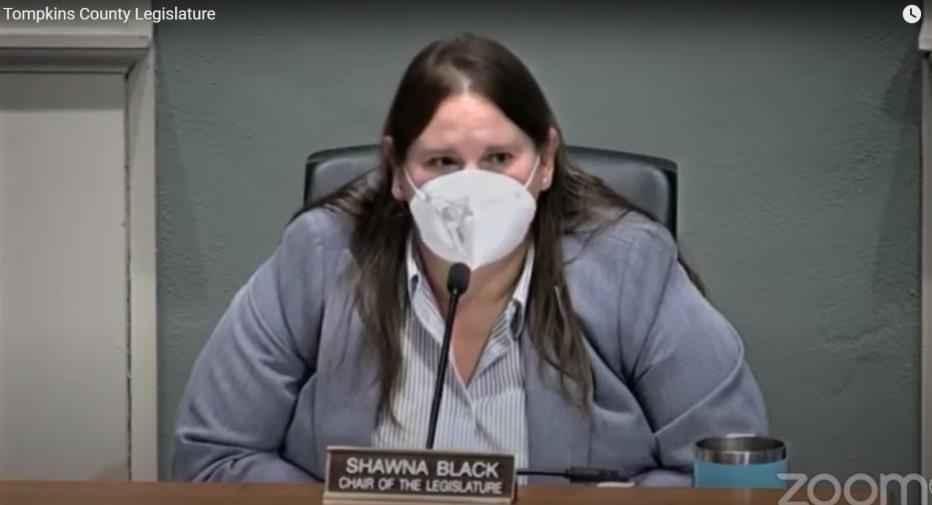
by Robert Lynch, March 2, 2022
“Why are they doing that?” Shawna Black’s young son asked her one night after school. “Are kids like me being killed?”
Black, Chair of the Tompkins County Legislature, shared her scared son’s words with her fellow County lawmakers Tuesday night (Mar. 1st) as legislators laid plans to fly the Ukrainian flag at the Courthouse complex, and multiple lawmakers lent support to the Ukrainian people as they face unprovoked attack by Vladimir Putin’s Russia.
“I was taken aback,” said Black, “that a ten-year boy understands the impacts of war and is trying to wrap his mind around what is going on in the other part of the world.”
Earlier Tuesday, Black had issued a statement of solidarity assuring the community that “The Tompkins County Legislature stands with the people of Ukraine.”
“We denounce the invasion and hope for a more peaceful resolution to this crisis and an end to the senseless killing and displacement,” the statement continued.
But speaking from the Legislature’s leadership desk Tuesday night, Black used words far less measured.
“As a parent, I worry for my children,” said Black. “I wonder what is going to happen. There’s a crazy person that is dictating what Russia’s doing. And I very much so worry that this person could make the wrong decision and really put us all at risk.”
Black took note that the Ukrainian invasion and its accompanying risk of nuclear war follow on the heels of a two-year pandemic. “It’s hard for some of us to see the light at the end of the tunnel,” she lamented.
Veteran legislator Mike Lane joined Black in her concern.
“This really bothers me a lot,” the Dryden lawmaker said. Lane, a Baby Boomer old enough to remember, recalled when the Soviet Union invaded Hungary when he was only six. Lane acknowledged the Cold War’s harsh reality, the same today as it was back then.
“We aren’t fools,” said Lane. “We know that Russia has nuclear weapons aimed at us, just like we have nuclear weapons aimed at it. And we don’t want to have World War III… even if they do.”
So for lack of military intervention, symbolism will have to do. Lane paid compliment to the many Ukrainian citizens who’ve made Tompkins County their temporary or permanent home. “We’re proud of them,” the Dryden legislator said. “We’re proud that they came here to share in our democracy.” And so the Tompkins County community flagpole will soon fly the yellow and blue banner—as soon as locals can find one.
“Frankly, we don’t have a lot of Ukrainian flags,” Lane admitted. Yet “we will have one here,” he assured those listening. “And we will display it. It will be a symbol.”
###
Tompkins legislators back “Birds and Bees” and “Bubble pack” bills
by Robert Lynch, March 2, 2022
When I was a boy on the farm, my dad always coated seed corn with what he called “crow dope,” stinky, tarry stuff that supposedly kept the crows from eating the seed after it was planted but before it germinated. As you’d expect, science has evolved—or devolved—in the 60 years since.
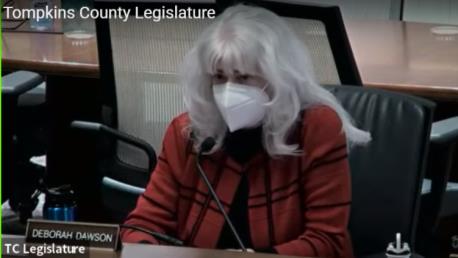
Tuesday night (Mar. 1st), the Tompkins County Legislature put its stamp of dis-approval on a kind of 21st Century “crow dope.” It urged New York to ban so-called “neonics” for treating corn, soybean, and wheat seeds.
The “Birds and Bees Protection Act,” as it’s called, would also, it states, “prohibit non-agricultural uses of neonics on turf and ornamental plants” and urge the Department of Environmental Conservation (DEC) to clamp tighter controls on the use of neonics for some remaining uses.
“To me, this is a no-brainer,” said Lansing legislator Deborah Dawson. “No bees; no food; we starve.”
The County’s long-winded Resolution of legislative endorsement claims neonic seed-treating chemicals leach into the soil, then into the water table, flow into the environment, and then poison bees and birds. They even infect the water we drink.
“Widespread use of neonics is a leading cause of declines in honey bees as well as pollinators and a threat to birds, fish, and the entire ecosystem,” the adopted Resolution states.
The Birds and Protection Act” remains pending before both the State Senate and Assembly. Though Tompkins legislators gave the measure overwhelming endorsement Tuesday—supporting it 12 votes to two—it remains uncertain whether Tuesday’s recommendation will affect Albany’s eventual decision.
Newfield-Enfield’s Randy Brown, who voted for the measure, nonetheless cautioned that a farmers’ group he’d met with had questioned whether the State Legislature should impose the restrictions, or whether they’d better come through DEC regulation. Enfield’s other County Legislator, Anne Koreman, countered that she understood the DEC lacked the power to regulate seed coating.
The Resolution quoted a Cornell study as concluding that neonics’ treatment of agricultural seed produced “no overall net-income benefit” to farmers using them, and that safer alternatives exist for most non-agricultural uses.
Only Republican legislators Mike Sigler and Lee Shurtleff opposed the Birds and Bees Resolution. Neither lawmaker explained why.
****.
Playing lobbyist a second time, the County Legislature also urged Albany passage of a mouthful of a bill to establish an “Extended Producer Responsibility System for Packaging and Printed Paper.” More simply put, the “EPR Program” would force packaging producers to take greater care so that what they produce doesn’t clog the landfills. The measure begs for someone to name it the “Bubble Pack Bill.”
“I remember shopping before bubble packs,” legislator Mike Lane said wistfully. Lane called bubble packs “one of the most difficult ways of marketing that packagers have.” For one thing, he said, it forces one to buy two, four, or 12 of something when they might need only one. The rest get wasted; thrown away, he said. This law, Lane stressed, “It’s something we need to do.”
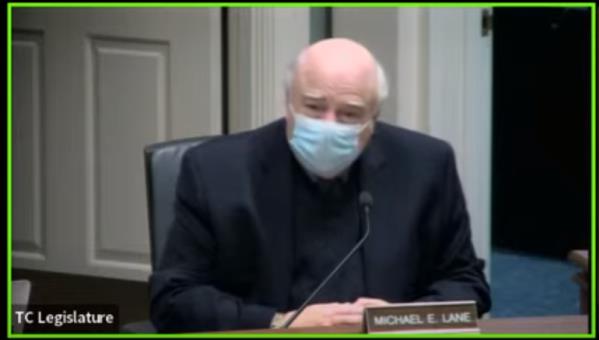
Barbara Eckstrom, Director of Tompkins County’s recycling program, added her support. “It’s now time for producers to help defray the cost of recycling,” Eckstrom insisted.
The County’s recycling program loses money. Prices for what’s recycled keep going down, and some materials—think bubble packs—use combined materials impractical to separate. The County Legislature’s adopted Resolution would force packaging producers to, in its words, “accept responsibility for the management of post-consumer products and packaging so those who produce these materials help bear the costs of recycling.”
One senses any final EPR legislation still faces a long run through the Albany sausage-grinder. But the local endorsement envisions an EPR law that would require producers to reimburse municipalities’ recycling the programs to cover the cost of their bad behavior. Eckstrom told lawmakers that former Governor Cuomo had blocked similar bills in the past, but she hopes Governor Hochul will lend her support.
However, Eckstrom also warned that the benefits from the new law might not show up for two-to-three years.
###

